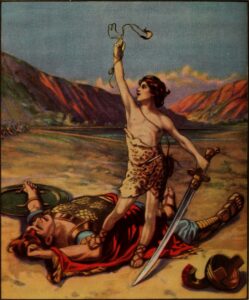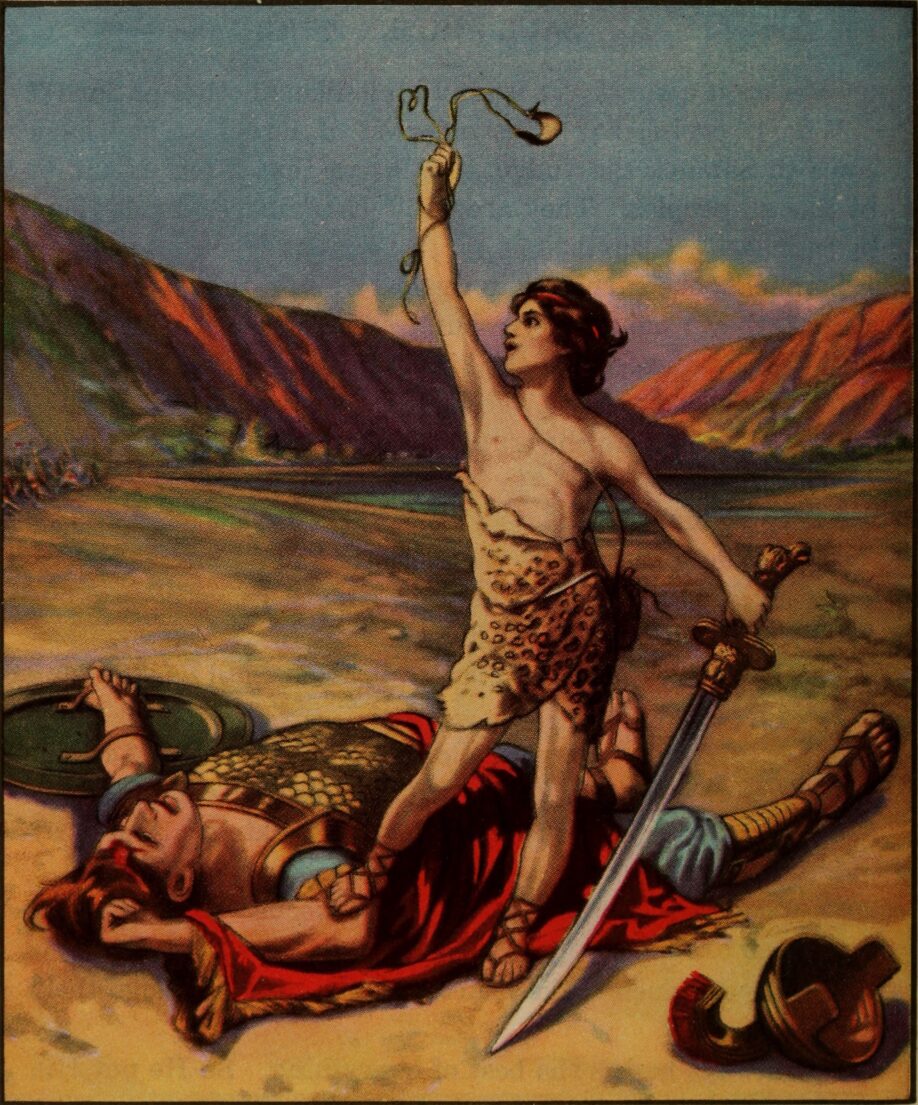
Some of my family: mama, siblings, spouses, and a nephew.
Families are _____________. I suppose there could be as many different answers to that as the number of people who read this post. Every family is unique and yet it seems all families have many of the same characteristics. Don’t we all have a “weird Uncle Harold” (or strange “Aunt Suzette”)–eccentric yet lovable in his/her own way? What about the “Grumpy old Geezer”? Or the “Cheek Pincher”? If you can pinpoint everyone in your family but one particular label–that person might be you! 😉
Every family also has its share of tragedy, success, celebration, and loss. Babies are born. People die. Generations pass down stories that live far beyond those who lived out the true events. Each family adopts unique traditions that sets it apart from the Smiths or Joneses down the street.
King David had a family, too. Believe me–they were as messed up as your family or mine. God joined David to Saul’s family when he married Saul’s daughter, Michal. Let’s face it–Saul brought a whole new level of crazy into David’s world.
When David married multiple wives that gave him scads of children, his family became more messed up than Saul’s or his birth family in Bethlehem!
For the sake of this post, let’s look at the family David deals with in my October 2024 release, Brave: The Story of Ahinoam.
David’s Parents, Jesse and Nitzevet
Though David’s mother’s name isn’t mentioned in the Bible, his father’s lineage is clearly delineated in the Book of Ruth:
“This, then, is the family line of Perez: Perez was the father of Hezron, Hezron the father of Ram, Ram the father of Amminadab, Amminadab the father of Nahshon, Nahshon the father of Salmon, Salmon the father of Boaz, Boaz the father of Obed, Obed the father of Jesse, and Jesse the father of David.”
Ruth 4:18–22
Who was Perez, and why begin the genealogy of King David with him? Perez was born of adultery. He was the son of Jacob’s son, Judah and his Canaanite daughter-in-law, Tamar. Could we get any more sordid than that? Well, yes. Tamar posed as a prostitute to lure her father-in-law, Judah, to sleep with her. Not a great beginning to a legacy, right?
But Boaz marries Ruth–a great story! Umm, not really. Ruth was a Moabitess, which broke the Law of Moses (Deut. 23:3). Judah had married a Canaanite (also forbidden by the Mosaic Law–Deut. 7:1, 3-4–but he lived BEFORE the Law was given at Sinai). Still, we see two “forbidden” marriages in David’s lineage. Remember this key information as we explore the rabbinic history of David’s mother.
David’s Mom, Nitzevet
Though never named in the Torah (or the Christian Old Testament), the name of David’s mother is widely accepted as Nitzevet. The story of David’s birth, though shocking to Evangelical Christians, is also widely accepted in Jewish documentation. The full story of Nitzevet can be found HERE, but I’ll give you a quick summary.
Sometime after Nitzevet had given Jesse sons, Jesse became convinced that his mixed lineage (specifically Ruth, his Moabitess ancestress) disqualified him to serve as a city leader at Bethlehem’s gate. He also felt unworthy of his wife and set her aside (separated from her), providing a small home for her outside the city walls.
After a period of time, Jesse decided to sleep with Nitzevet’s maid (a Canaanite). The maid knew how disheartened Nitzevet was about her husband’s unfounded guilt, so she went to Nitzevet and told her of Jesse’s plan. Nitzevet and the maid did a switch similar to Rachel and Leah in which Nitzevet changed places with the maid and slipped into Jesse’s bed without his knowledge on the night he’d planned to sleep with her maid.
The Proof Is In the Hair
When Nitzevet’s belly proved she was expecting a child–but she was still living away from her husband–Jesse and his sons publicly accused her of adultery. She was shamed before the whole city but was redeemed when David was born with the “ruddy” appearance (1 Samuel 16:12 ESV) of Jesse’s clan.
Jewish history (the Talmud and Midrash) tells us that Jesse received Nitzevet back into his household after David’s birth. However, their youngest son’s controversial birth certainly explains why David was nowhere to be found when Samuel came to anoint one of Jesse’s sons as Israel’s next king. (1 Samuel 16)
David’s Brothers
There has been some controversy over how many brothers David had. It seems when Samuel came to anoint Israel’s next king, David had seven brothers:
Jesse had seven of his sons pass before Samuel, but Samuel said to him, “The Lord has not chosen these.” So he asked Jesse, “Are these all the sons you have?” “There is still the youngest,” Jesse answered. “He is tending the sheep.”
1 Samuel 16:10–11 (emphasis added)
However, we read only six named brothers of David in a later record written by the Chronicler:
Jesse was the father of Eliab his firstborn; the second son was Abinadab, the third Shimea, the fourth Nethanel, the fifth Raddai, the sixth Ozem and the seventh David.
1 Chronicles 2:13–15 (emphasis added)
Several commentaries explained the seeming discrepancy with a tragic but likely answer. Perhaps one of Jesse’s sons was killed in a war. In the chapters of 1 Samuel following, we’re told David leads several campaigns against the Philistines. Israelite men would have died in those skirmishes–perhaps one of David’s own brothers.
 We can see strong reasons for tension between David and his brothers because of the circumstances of David’s birth (from Jewish history) and the slight they suffered by Yahweh and His prophet Samuel (recorded in the Bible). We see further evidence of tension between them when Jesse sends David with food and supplies to the brothers who have gathered with Saul’s army to fight the Philistines and their giant, Goliath. They offer David a less than cordial welcome:
We can see strong reasons for tension between David and his brothers because of the circumstances of David’s birth (from Jewish history) and the slight they suffered by Yahweh and His prophet Samuel (recorded in the Bible). We see further evidence of tension between them when Jesse sends David with food and supplies to the brothers who have gathered with Saul’s army to fight the Philistines and their giant, Goliath. They offer David a less than cordial welcome:
When Eliab, David’s oldest brother, heard him speaking with the men, he burned with anger at him and asked, “Why have you come down here? And with whom did you leave those few sheep in the wilderness? I know how conceited you are and how wicked your heart is; you came down only to watch the battle.” “Now what have I done?” said David. “Can’t I even speak?”
1 Samuel 17:28–29
It seems evident that David’s growing up years were fraught with conflict and unkindness, yet this “shepherd boy,” who had repeatedly been rejected by his family, was the one chosen by God. I LOVE THAT!
David’s Sisters
The 1 Chronicles 2:13-15 passage above names eight of Jesse’s sons and is then followed by this roll call of two sisters and their families:
Their sisters were Zeruiah and Abigail. Zeruiah’s three sons were Abishai, Joab and Asahel. Abigail was the mother of Amasa, whose father was Jether the Ishmaelite.
1 Chronicles 2:16–17
The identity of David’s sisters–I should say half-sisters–was perhaps the second-most startling discovery after uncovering the turmoil about Nitzevet’s unusual conception.
I’ve read the whole Bible many times and studied the Book of 1 Samuel even more often; however, I never noticed the impact the following two verses would have had on Jesse’s clan and, eventually, David’s rule.
Absalom had appointed Amasa over the army in place of Joab. Amasa was the son of Jether, an Ishmaelite who had married Abigal, the daughter of Nahash and sister of Zeruiah the mother of Joab. The Israelites and Absalom camped in the land of Gilead.
2 Samuel 17:25–26 (emphasis added)
WHAT?!?! Who is this Nahash fella?
Jewish legends offer two possibilities:
- He was at one time Nitzevet’s husband and the father of her two daughters before she married Jesse.
- (This is the one I used in Brave.) He was Nahash, King of the Ammonites, who raided the southern towns of Judah and stole Nitzevet from Bethlehem, holding her captive for nearly two years before Jesse and a brave group of Judean men rescued her.
David’s Nephews
The Bible mentions four of David’s nephews who participated in his army:
- Zeruiah’s sons: Joab, Abishai, and Asahel (all named among David’s Mighty Men – 1 Chronicles 11:10-47)
- Abigal’s son: Amasa (an Ishmaelite’s son, a tribe known for its archery skills – Genesis 21:20)
Today’s Question:
- Did you learn anything new today? If so, how does it change the way you’ll read David’s story in the Bible–or in biblical fiction?
Did you enjoy this post? Never miss out on future posts by following my blog. Or sign up for my newsletter and you’ll receive a free novella as well as exclusive monthly giveaways and book news in your inbox! Because I’m an Amazon advertising affiliate, a small commission is earned when purchases are made using Amazon links on this site. Thank you for your support!




Comments 2
Once again you have brought forward things I never knew. I thought I knew about David, but I find things I had not realised. I did not know his mothers name. I read the full article about Nitzevet, the Mother of David and have kept it to read again. I had not realised that David was so reviled/rejected by his family or why. I always thought that David was not brought before Samuel because he was thought to be too young and so of no consequence.
I am astounded at how you have dug up these treasures of information. I am so intrigued I want to read more of The Jewish Woman.org articles and Chabad.Org sites. Nothing replaces the Bible, which is the only book that we can say is 100% without error. But I have been learning that the English language does not always give us the exact meaning of the original language. Thank you once again. I look forward to reading these 4 books about David and his wives.
Author
Hey, sweet gal!
I’m so glad you’re enjoying this extra historical info on David. The “what ifs” that we find in the additional writings are what makes for some very interesting twists and turns in biblical fiction. As you mentioned, the Bible is our only 100% Truth, but the ancient Jewish writings have been handed down for centuries and may have some kernels of truth in their similarities, which is the golden thread I seek while reading a wide variety of sources. Enjoy your extra reading as well, but–as I do–ALWAYS come back to the Bible for Truth! Hugs to you, dear one!